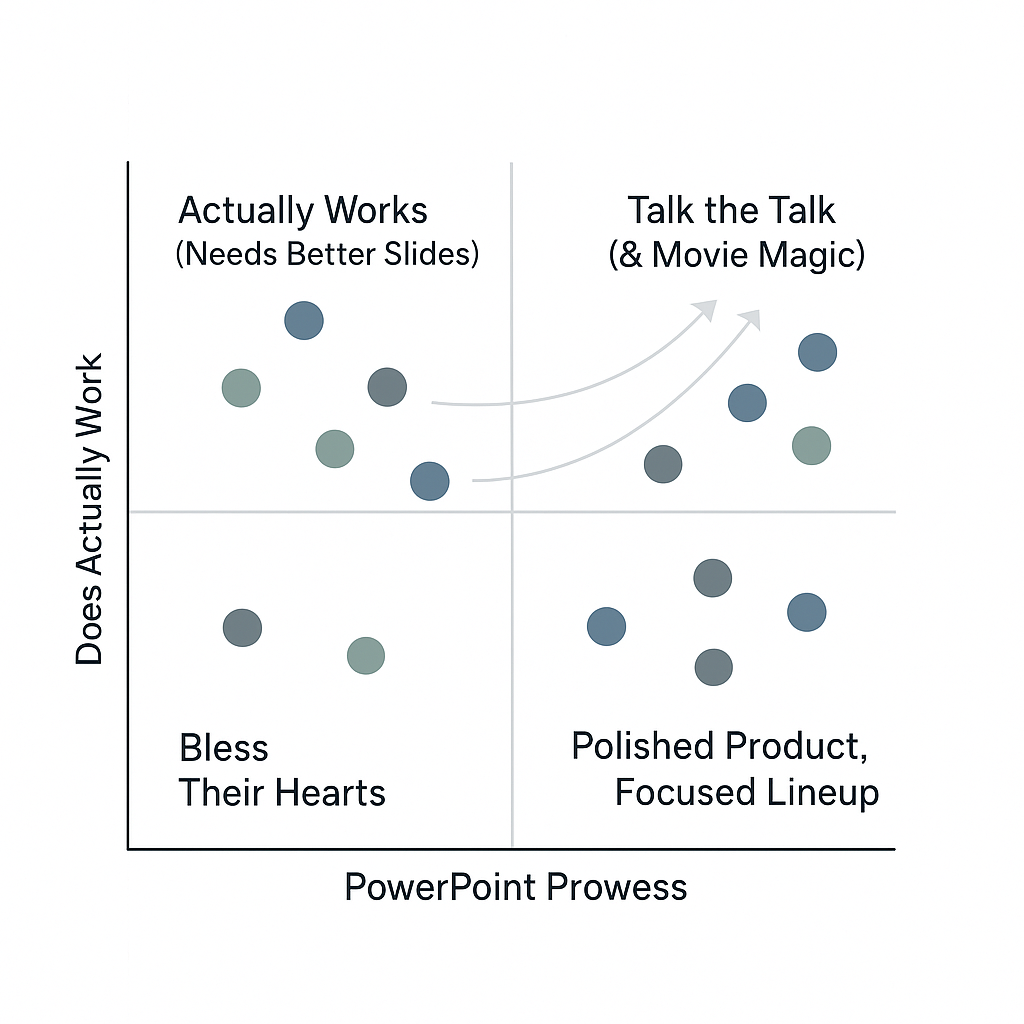Melissa Burroughs on scaling PMM productivity, balancing AI efficiency with messaging alignment, and preserving the human element in marketing
Listen now on YouTube | Spotify | Apple Podcasts

Generative AI is reshaping product marketing in ways that extend well beyond tool adoption. For marketing leaders, this shift creates both opportunities and challenges as teams recalibrate their operations, talent profiles, and strategic focus.
In a recent episode of the Data Faces podcast, Melissa Burroughs, Product Marketing Director at Alteryx, shared insights into this transition. Burroughs brings an uncommon perspective to the marketing technology intersection. Her background in experimental physics—including research on plasma afterburners and particle accelerators—has equipped her with analytical rigor that now complements her product marketing leadership. This blend of scientific precision and narrative skill exemplifies the technical-creative fusion increasingly essential in modern B2B marketing.
The shift for PMMs isn’t just about using new tools—it’s about redefining the balance between technology and human judgment. — Melissa Burroughs, Product Marketing Director, Alteryx
About Melissa Burroughs
Melissa Burroughs is Product Marketing Director at Alteryx, where she leads teams at the intersection of analytics and marketing. Her background includes an MS in Applied Physics and research in accelerator physics before transitioning to software and analytics. Burroughs has built product marketing organizations from scratch and led high-performing teams across multiple companies. Her perspective combines deep technical understanding with a passion for translating complex capabilities into compelling customer narratives.
The Three-Dimensional Transformation of Product Marketing
Product marketing teams are witnessing a compression of traditional timelines, a reshaping of organizational roles, and an elevation of performance expectations—all driven by generative AI capabilities. “Things that used to take hours, like drafting a long-form asset or exploring a market trend, now take minutes,” Burroughs notes.
This acceleration plays out differently across organizational contexts. Large enterprises move cautiously with governance controls that moderate adoption. Midsize companies like Alteryx have evolved from experimental exploration to structured implementation. Meanwhile, startups integrate AI across their entire marketing workflow. As Burroughs explains, “Your mileage may vary.”
With baseline productivity rising across the industry, performance expectations escalate in parallel. The productivity gains from AI don’t simply create slack in the system—they raise the bar for what marketing teams deliver. “That’s a huge win, but it raises the expectation for what a PMM can and should deliver,” Burroughs observes. This heightened expectation creates additional pressure even as some tasks become easier.
When generative AI enters your marketing department, it doesn’t just change what people do—it fundamentally shifts what leadership should expect. — Melissa Burroughs, Product Marketing Director, Alteryx
The Amplified Value of Human-Centric Skills
As AI handles routine execution tasks, human capabilities become more valuable as market differentiators. For example, bringing teams together across functional boundaries becomes increasingly important. Burroughs characterizes product marketing as “the glue team” positioned between development and go-to-market (GTM) functions. “Not just creating a strategy, but also being able to bring together different, smart, and diverse people to actively agree on it, push it forward. AI is not going to do that.” This ability to orchestrate alignment separates high-performing marketing organizations from the rest.
Domain expertise provides the essential quality control mechanism for AI outputs. “Gen AI, you might be able to produce a lot—it scales tasks like content creation really well, but Gen AI doesn’t know anything,” Burroughs explains. Without deep product and market knowledge, marketing teams risk distributing plausible-sounding but incorrect content. This expertise becomes the critical filter determining whether AI enhances or undermines marketing effectiveness.
Burroughs’ concept of “strategic disappointment”—making deliberate choices about which stakeholders and requests take priority—becomes essential when AI expands production capacity. “I can be selective about who I need to satisfy and who I might be able to disappoint, at least in the near term, which cans can be kicked down the road just a little bit,” she explains. This prioritization skill prevents teams from simply saying yes to everything AI makes technically possible, keeping focus on high-impact work.
In an AI-powered marketing world, your team’s ability to separate signal from noise becomes their most valuable asset. — Melissa Burroughs, Product Marketing Director, Alteryx
Strategic Vulnerabilities to Recognize and Mitigate
As organizations integrate generative AI into their marketing operations, new accountability challenges emerge. “As a PMM, we are stewards of the message, no matter what tools created it, no matter how it came to be,” Burroughs emphasizes. “We need to own it before, especially before it leaves the house, ideally before it leaves our desk.” When teams see AI as responsible rather than themselves, quality deteriorates regardless of technical sophistication.
Content homogenization threatens brand differentiation as AI systems trained on similar data produce similar outputs. “AI makes it really easy to sound like everyone else,” Burroughs notes. Companies can address this through stronger editorial guidelines, distinctive tone documentation, and rigorous review processes that evaluate content for accuracy and messaging alignment.
Small errors compound into significant trust issues with customers. Burroughs highlights how seemingly minor linguistic mistakes—like confusing “complimentary” and “complementary”—erode credibility: “It is a small leap for that reader to go from ‘they don’t seem to know words’ to ‘what else don’t they know.'” Maintaining rigorous quality standards becomes more important, not less, as AI accelerates content production.
The greatest risk isn’t AI making a mistake—it’s marketers not feeling responsible for catching it. — Melissa Burroughs, Product Marketing Director, Alteryx
The Ethical Framework for AI-Enhanced Marketing
The ethical dimensions of AI-enhanced marketing require more than philosophical guidelines—they demand operational protocols. Documentation of AI’s role in content creation serves as both quality assurance and accountability infrastructure. “If Gen AI has helped you develop a particular piece of messaging, you need to note that in the internal documentation,” Burroughs advises. This practice enables better performance management and resource allocation decisions by clarifying how work is actually being performed.
Different audience contexts require different transparency approaches. Inside the organization, detailed attribution helps teams understand workflows and capabilities. External audiences typically care more about results than methods. As Burroughs observes, “If I’m reading a vendor’s website, I’m not particularly concerned whether it was a full-time W2 employee who wrote it, a contract content marketer, or some AI bot that generated the content. I care about its impact.”
Protecting proprietary information requires clear boundaries and tools. “Before you start, check your company’s AI policy… Do not share this data with a public AI tool,” Burroughs warns. “It could jeopardize your business, let alone get you in trouble.” Organizations should establish controlled environments for AI usage that prevent sensitive data exposure while enabling productivity gains.
Quality verification processes need to examine multiple dimensions of AI outputs, including factual accuracy, language precision, brand alignment, and regulatory compliance. This review step often requires subject matter experts from multiple disciplines depending on content type and audience.
The question isn’t whether to disclose AI use, but rather which stakeholders need what level of transparency—and why. — Melissa Burroughs, Product Marketing Director, Alteryx
The Evolving Profile of Marketing Talent
The capabilities that define marketing success are shifting as AI capabilities expand, with strategic thinking becoming a key competitive advantage that AI cannot replicate. “Strategy is going to take center stage in the coming years for PMMs,” Burroughs predicts. “Things that used to give PMMs an edge, like being a content machine… with AI doing content Gen that is no longer going to be much of a differentiator for professionals.” Marketing leaders should emphasize critical analysis and synthesis skills in both hiring and development.
Traditional entry paths into marketing face disruption as AI handles tasks once assigned to junior staff. “A new grad coming into an organization… they often cut their teeth on tasks like maybe they’re writing social posts or blog copy,” Burroughs explains. “But AI does that faster and, frankly, often better than junior employees, and that actually robs people of hands-on learning opportunities.” Organizations need new approaches to developing junior talent when traditional starter assignments become automated.
Effective AI collaboration itself becomes a core marketing skill. “I see one of the roles that Gen AI can perform… is one of brainstorming partner, having an infinitely patient, resourceful individual there to talk out ideas with you,” Burroughs notes. “But again, I don’t see it as an outsourced task. You are leading. The AI is supporting you.” The best marketers use AI to expand their thinking rather than replace it.
Hiring criteria need to evolve beyond production capabilities to emphasize judgment, collaboration, and domain expertise. Technical execution skills that once dominated job descriptions become table stakes rather than differentiators.
Tomorrow’s marketing leaders won’t be measured by how well they use AI, but by how effectively they collaborate with it. — Melissa Burroughs, Product Marketing Director, Alteryx
Implementation Considerations for Executives
Marketing leaders need practical approaches to integrate AI effectively into their operations, and many organizations are evolving from prohibition to controlled adoption of AI tools. Burroughs experienced this evolution: “Over time, we transitioned to adopting a controlled generative AI solution, and that completely shifted how I could use these tools.” Organizations should establish clear policies covering approved tools, appropriate use cases, required reviews, and governance mechanisms.
Marketing leaders must actively balance productivity gains against brand consistency. This requires clear documentation of brand voice, editorial standards that go beyond technical accuracy, and review processes that evaluate whether AI-generated content maintains the organization’s distinctive perspective.
Effective guardrails protect against risk while enabling innovation. Examples include limiting AI use to specific content types, requiring human review for customer-facing materials, and implementing multi-stage approval workflows for high-stakes communications. Too many constraints prevent teams from realizing AI’s benefits; too few create unnecessary risk.
New measurement approaches need to look beyond productivity metrics to assess AI’s strategic impact. Organizations should track how AI affects message consistency, customer engagement, sales enablement effectiveness, and conversion metrics—not just content volume or production speed.
Conclusion
The integration of generative AI into product marketing creates an apparent contradiction: as execution becomes more automated, strategic judgment becomes more crucial. Far from reducing the need for marketing expertise, AI amplifies the importance of applying that expertise to the right questions and decisions.
Marketing leaders should begin by assessing their team’s readiness for this transition. This means evaluating not just technology access but also domain expertise, collaboration capabilities, and strategic thinking skills. It means identifying where AI can create genuine strategic advantage rather than simply automating whatever can be automated.
The opportunity in this transition isn’t about adopting AI fastest or most comprehensively—it’s about integrating it most thoughtfully. Organizations that find the right balance between technological capability and human judgment will create marketing functions that combine efficiency with creativity, nuance and strategic insight that only humans can provide.
The winners won’t be those who adopt AI fastest, but those who integrate it most thoughtfully. — Melissa Burroughs, Product Marketing Director, Alteryx
If you’re interested in learning more about how B2B product marketing or how you can use generative AI, check out these TinyTechGuides.
Modern B2B Marketing: A Practitioner’s Guide to Marketing Excellence
The PMM’s Prompt Playbook: Mastering Generative AI for B2B Marketing Success
Or the full series:
TinyTechGuides (7 book series) Paperback Edition
Edited Transcript: Data Faces Podcast with Melissa Burroughs
David Sweenor (0:00): Welcome to the Data Faces podcast that explores the human stories behind data analytics and AI. Today we’re discussing how generative AI is reshaping the role for product marketing managers with Melissa Burroughs, Product Marketing Director at Alteryx.
Melissa Burroughs (1:23): Beyond my work in technology product marketing, I do have experience with a few weird things that include accelerator physics research and medical data analytics. I like to quote JRR Tolkien, which is “not all those who wander are lost.” I was a big fan of theoretical physics, but I like to joke I didn’t understand enough math to do theory, so I was an experimentalist. Over the last 15 or so years, I’ve worn many hats in the software industry. I went from science to analytics into pure software. It’s really all been about bringing together technology and inspiration, and that inspiration quickly became storytelling for me.
David Sweenor (3:49): How is generative AI transforming your work as a PMM?
Melissa Burroughs (3:49): Gen AI is definitely having a big impact on product marketers in three key ways. First, Gen AI is supercharging PMM productivity. We can draft content faster, research and develop a point of view much more quickly, and even create visuals without always needing a designer. Things that used to take hours now take minutes—that’s a huge win, but it raises the expectation for what a PMM can and should deliver.
Second, the amount of change varies depending on the organization. A larger, more established company is going to move slower with Gen AI due to governance concerns and internal processes. For a while, my own company even frowned on using Gen AI tools because of data security concerns. Over time, we transitioned to a controlled generative AI solution, which completely shifted how I could use these tools. If you’re at a small startup, they’re jumping in full throttle, expecting PMMs to use Gen AI for nearly everything.
David Sweenor (7:15): With AI automating these tasks, what part of the PMM’s job becomes more valuable and human-centric?
Melissa Burroughs (7:15): Three aspects of the PMM role are becoming even more critical. There’s the collaborative element—we are the glue team between development teams and go-to-market teams. Influencing and aligning stakeholders has always been key, but now it’s critical with Gen AI. AI is not going to bring together different, smart, diverse people to actively agree on strategy and push it forward.
Then there’s the depth of expertise. Gen AI might produce a lot and scale content creation well, but it doesn’t know anything. PMMs will need to act as a BS filter for AI. You’ve got to ensure what the AI suggests is correct and relevant. If you don’t have that expertise, you risk putting out bad content and making poor decisions.
David Sweenor (9:32): Where do you find the time to become an expert in your product, field, and competitors if you’re doing more with less?
Melissa Burroughs (9:32): What has worked best for me has been ruthless prioritization. I’ve developed sufficient professional judgment that I can be selective about who I need to satisfy and who I might disappoint, at least in the near term. We’re not set up to win here—we’re not being given luxurious time to research and deeply understand our market in highly production-oriented roles. This means being thoughtful about what’s going to move the needle and what might be extra.
David Sweenor (10:12): Are there surprising ways that AI is making PMMs less effective?
Melissa Burroughs (10:12): AI can make you less effective if you’re not thoughtful about how you apply it. The number one mistake I observe is outsourcing inappropriate tasks or abdicating responsibility for the output. As PMMs, we are stewards of the message, no matter what tools created it. We need to own it before it leaves the house. This lack of ownership leads to issues—whether it’s a blog post that reads like gobbledygook you didn’t proofread, timelines that don’t make sense, or incorrect analysis.
David Sweenor (12:16): How does your subject matter expertise play into this when AI makes up stuff all the time?
Melissa Burroughs (12:16): PMMs are going to need even deeper expertise about their product, market, and audience. Gen AI might produce a lot, but it doesn’t know anything. It makes silly mistakes even in simple use cases. PMMs need to act as a BS filter for AI, ensuring what AI suggests is correct and relevant. If you don’t have that expertise, you risk putting out bad content and making poor decisions.
David Sweenor (18:31): How do you balance efficiency gains with brand authenticity and customer trust?
Melissa Burroughs (18:31): It’s about being deliberate at every step. First, AI makes it really easy to sound like everyone else, so we need vigilance against that regression to the mean. Second, we need to be careful around interactions becoming impersonal with customers. Third, customer trust can be damaged by misleading information.
Small errors add up to impact trust significantly. Think about the difference between “complimentary” and “complementary”—use the wrong version, and suddenly you’ve created confusion. Small errors like that add up to impact trust big time. It’s a small leap for that reader to go from “they don’t seem to know words” to “what else don’t they know?”
David Sweenor (23:13): What does a PMM need to care about regarding ethics when using Gen AI?
Melissa Burroughs (23:13): There are four big areas: transparency, accountability, privacy, and bias. For PMMs, transparency means being clear, at least internally, about when and how you’ve used Gen AI in your work. If Gen AI helped you develop messaging, note that in the internal documentation.
Privacy is critical—before you start, check your company’s AI policy. If there are proprietary or confidential data points, do not share this data with a public AI tool. It could jeopardize your business and get you in trouble.
David Sweenor (28:37): How does the PMM role evolve looking ahead a year or two?
Melissa Burroughs (28:37): I see Gen AI reshaping the PMM function in three big ways. Strategy is going to take center stage in the coming years. AI is going to drive a shift in what’s expected from each PMM. And this could lead to fewer entry-level PMM roles.
Things like being a content machine used to give PMMs an edge, but with AI doing content generation, that’s no longer going to be much of a differentiator. Those who will thrive professionally are those who can think critically and solve complex problems. The challenge for new grads is that they often cut their teeth on tasks like writing social posts or blog copy, but AI does that faster and often better than junior employees. This robs people of hands-on learning opportunities.
David Sweenor (33:44): Should we use Gen AI for more strategic things rather than just routine tasks?
Melissa Burroughs (33:44): I see one of the roles Gen AI can perform as a brainstorming partner—having an infinitely patient, resourceful individual to talk out ideas with you. On those high-value strategic tasks, AI is a wonderful sounding board to help clarify your ideas and pressure test them. But I don’t see it as an outsourced task. You are leading, and the AI is supporting you. You’re not asking AI to figure it out for you.
David Sweenor (34:46): What advice do you have for PMMs just starting to explore Gen AI?
Melissa Burroughs (34:46): Start small and improve your work life. Think about AI’s professional potential. Protect your data—check your company’s AI policy and do not share private data with public AI tools.
Melissa Burroughs (38:09): AI is here to make our lives easier. It’s not here to replace us. Lean on it for what feels natural and explore as you go. I’m excited about the future.
Transcribed and edited from the original conversation


